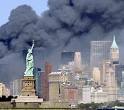Rosebud #288

In his speech the other night, announcing his clinching of the Democratic nomination, Barack Obama—who henceforth shall be known as "Zeitgeist"; it should be his Secret Service code name; for what man has come to embody the spirit in the land more than this one, like some pop cultural Jesus, which is how a lot of people seem to see him—in his speech the other night, Zeitgeist made no mention of 9/11. Uh-oh, Zeitgeist. That's kind of worrisome. What it means is that the zeitgeist doesn't want to hear anything about 9/11. It doesn't want to see politicians capitalizing on it anymore. It wants to move on, and beyond, all that darkness and trouble and fear and manipulation. And all those unanswered questions.
It's quite understandable. But also worrisome. Because when unanswered questions go unanswered, they tend to fester; and when criminals go unpunished, then tend to strike again. What will happen, God forbid, if—and not if, but when, many "experts" say—there is another terrorist attack, perhaps bigger and badder, sending us back into the dark fear and submission that kept us from asking too many questions when the Bush administration ramrodded through the Patriot Act, launched wars in Afghanistan and Iraq, legalized domestic spying and torture... 9/11. It's all about 9/11, whether it's become polite—or politically advantageous—to mention it or not.
The military trial of Khalid Sheikh Mohammed is getting barely any coverage (and what there has been has not focused on substance, but rather the fact that the apparently touchy terrorist objected to a court cartoonist's rendering of him). If you remember, in March, 2007, "KSM" confessed to a laundry list of failed Al Qaeda plots, everything from the attempted Richard Reid shoe bombing to the assassination of Jimmy Carter. Oh, KSM is a bad guy from way, way back. But there is also a fair amount of doubt as to whether he is actually responsible for 9/11—which he confessed to after being tortured, waterboarded (and, some reports say, his children were abused while being questioned). His trial comes conveniently during a presidential election, when the Republicans are fighting to maintain control. If he is convicted, they will be able to say, We prosecuted the crime of 9/11! We caught the bad guy and (probably) sentenced him to death! Unfortunately this is hardly likely to put the matter to rest. And by the way, whatever happened to Osama bin Laden?
From Paul Thompson's cooperativeresearch.org:
An article in the New Yorker magazine reveals that the CIA interrogations of 9/11 mastermind Khalid Shaikh Mohammed (KSM) were not as reliable as they are typically made out to be. KSM was interrogated with methods such as waterboarding that are regarded as torture by many. CIA official John Brennan, former chief of staff for CIA Director George Tenet, acknowledges, “All these methods produced useful information, but there was also a lot that was bogus.” One former top CIA official estimates that “ninety per cent of the information was unreliable.” Cables of KSM’s interrogation transcripts sent to higher-ups reportedly were prefaced with the warning that “the detainee has been known to withhold information or deliberately mislead.” [NEW YORKER, 8/6/2007] For instance, one CIA report of his interrogations was called, “Khalid Shaikh Mohammed’s Threat Reporting—Precious Truths, Surrounded by a Bodyguard of Lies” (see June 16, 2004). [LOS ANGELES TIMES, 6/23/2004] Former CIA analyst Bruce Riedel asks, “What are you going to do with KSM in the long run? It’s a very good question. I don’t think anyone has an answer. If you took him to any real American court, I think any judge would say there is no admissible evidence. It would be thrown out.” Senator Carl Levin (D) says, “A guy as dangerous as KSM is, and half the world wonders if they can believe him—is that what we want? Statements that can’t be believed, because people think they rely on torture?” [NEW YORKER, 8/6/2007] Journalist James Risen will also say in a 2006 book, “According to a well-placed CIA source, [KSM] has now recanted some of what he previously told the CIA during his interrogations. That is an enormous setback for the CIA, since [his debriefings] had been considered among the agency’s most important sources of intelligence on al-Qaeda. It is unclear precisely which of his earlier statements [he] has now disavowed, but any recantation by the most important prisoner in the global war on terror must call into question much of what the United States has obtained from other prisoners around the world…” [RISEN, 2006, PP. 33]
<< Home